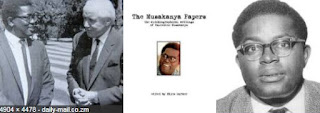Musakanya's Burden
I first came across the ideas of Valentine Musakanya when my
local book club included on its reading list a book entitled “the Musakanya
Papers: The autobiographical writings of Valentine Musakanya”. The book itself
is a poorly packaged affair, in white paperback, featuring a grainy picture of
a bespectacled Valentine Musakanya, flashing a toothy smile. It is edited by
Miles Larmer a British professor of African History. Published by the Lembani
Trust, the book is a collection of Musakanya’s biographical writings picked
from his over 220 thousand word hand-written notes. At the time of the
publication in 2007, Lembani Trust had announced that the “Musakanya Papers” was
just the first in a planned number of publications from Musakanya’s writings.
With ten years gone since the first publication however, there is no indication
that a sequel is on the way.
Followers of Zambia’s post-independence history will
recognise Musakanya as the country’s first Secretary to the Cabinet who went on
to serve the country in other notable positions including as Governor of the
Central Bank and Minister of State under Kenneth Kaunda’s United National
Independence Party (UNIP). His disappearance from public life would see him
become IBM Africa general manager, a job he took on with his trademark
dedication and razor sharp intellect.
Despite all of this, Musakanya is perhaps best known for his
role in the 1980 coup attempt against Kaunda’s UNIP government. Musakanya along
with others such as lawyer Edward Shamwana were arrested and charged with
treason and later convicted by the High Court of Zambia and sentenced to hang.
Musakanya managed to have his conviction overturned upon appeal to the Supreme
Court though not before he had spent a good four years in jail. There are two
versions regarding the grounds for Musakanya’s appeal to the Supreme
Court." Miles Larmer states that the appeal was based on evidence that
Musakanya’s confession was obtained through torture, while Andrew Sardanis, a
man Musakanya once referred to as a “brother” and who has written extensively
on Zambia’s contemporary history, roundly discredits the allegations of torture
and insists that Musakanya was never tortured but that rather the conviction
was overturned on the basis that the High Court judge relied on Police
interrogation notes which were erroneously admitted as evidence of a confession.
Musakanya emerged from jail a much changed man. He passed
away in 1994.
The Musakanya Papers continue to provide a voice for this
remarkable man. They contain much more than a detail of Musakanya’s role in the
1980 coup attempt. Understandably though, some reviews of the book have devoted more space to the coup issue. The book contains ideas, opinions
and observations regarding public policy, leadership and the themes of the time
as seen through Musakanya’s keen eye.
Dr Guy Scott who served as Zambian Republican Vice President
in the Patriotic Front government hailed Musakanya’s writings as perhaps the
most plausible explanation of how one Kenneth David Kaunda took over a
prosperous “high end” underdeveloped nation in 1964 and turned it, over 27 years,
into a bankrupt, disease-ridden, police state in which the public were
constantly invoked. Although Dr Scott’s view is an over simplification,
Musakanya’s writings show that there was certainly scope for managing the
affairs of the country differently.
The
book contains Musakanya’s candid and lucid views on issues that affected him
not only as the Head of the Civil service but also his ideas on rural
development, national philosophies and an assessment of Kenneth Kaunda the man.
On
what makes a good civil servant, Musakanya insisted that a civil servant should
be truly educated and not merely certified. One suspects that Musakanya would
have been highly critical of the current wave of questionable education
institutions in Zambia, whose only purpose apart from making money, is fuelling
of empty credentialism. Added to these, Musakanya regarded a good civil servant
as one who provided leadership, could delegate and was knowledgeable in the
law. In his own words, a civil servant should be a man of “solid, all-round
intellectual capacity, who continues to keep himself abreast with the current
voluminous general knowledge and finds its place in history, past and future”.
Musakanya’s
insistence on knowledge is perhaps exhibited in his abhorrence of a certain political
cadre he termed educated illiterates. His writings exhibit a veritable
irritation with a number of individuals who were allowed to occupy certain
offices without the requisite educational skills. This however must be
understood against the backdrop of the UNIP’s government twin quest to “Zambianise”
the economy, while at the same time trying to mollify its members by offering
them jobs even when they were ill-qualified for the same jobs. For example he
noted that despite Zambia’s first cabinet being keen and enthusiastic, much of
the substance discussed in cabinet meetings was generally above their heads.
The
Musakanya Papers also provide rare insight into the relationship between the
then president Kenneth Kaunda and his one-time colleague, turned political
opponent, the late Simon Mwansa Kapwepwe. Although Kaunda and Kapwepwe started
out as very close associates having grown up together in Chinsali, Kaunda was
dogged by the lack of a constituency he could depend on as it was a well-known
fact then that his parents had hailed from Malawi (This fact was cruelly
exploited when the Movement for Multi-party Democracy government managed to
amend the republican constitution and made it unlawful for anyone without
Zambian parentage to contest presidential elections in Zambia. Kenneth Kaunda
and his UNIP boycotted the 1996 elections
in protest against this provision).
The
book also shows the lengths to which Kaunda was willing to go in order to
maintain a certain perception of himself among the local public as well as the
international community. Perhaps as a result of his lack of a constituency and
the desire to preserve power, Musakanya describes Kaunda as exhibiting
pathological ambivalence. For example, there were image building undertakings
which included engaging British image builders Colin Morris and Mervyn Temple.
This coupled with the crafting of an ambitious yet ambiguous national
philosophy “Humanism” was meant to project the then modern African leader,
vibrant, intelligent and patriotic.
This strategy was clearly flawed. Despite the
creation of a Ministry of Humanism and the philosophy being taught in schools,
few if any knew what Humanism really entailed. Apart from being a rallying
point for slogans, there was little to distinguish Humanism from
socialism/communism. As Musakanya notes, although more money was spent on
Humanism than that spent by all Christian churches in Zambia, apart from
belief, there was really nothing that Humanism achieved.
Musakanya
has been dead for over two decades, yet his apt observations on government and
Zambian society in general remain relevant to this day. Although the 1980
attempted coup continues to cast a lengthy shadow over his legacy there is
enough in his writings to make the modern day leader stop and think.
Times
might have changed, yet the way politics are done in Zambia continues to follow
an eerily familiar pattern. The country has failed to adequately diversify its
economy. Politics continue to be devoid of substance with political allegiance
in the main clustered along regional and tribal cleavages as evidenced by the
distribution of electoral results for all
major elections. Political leadership continues to be flagrantly build around
individual loyalties and patronage. Indeed Valentines voice though distant is as relevant today
as it was decades ago. And for this reason Valentine Musakanya should never be
forgotten.


Pakan Ayam Yang Dapat Meningkatkan Stamina Dan Juga Daya Tahan Tubuh Ayam Klik Di Sini
ReplyDeleteAgen Sabung Ayam Online Terbaik Dan Juga Terpercaya http://www.bakarayam.co
Informasi Terlengkap Mengenai Sabung Ayam
https://ayambakar33033.wordpress.com/2018/07/13/langkah-untuk-mengetahui-jenis-ayam-panus-aduan-asli-dan-juga-keistimewaannya/